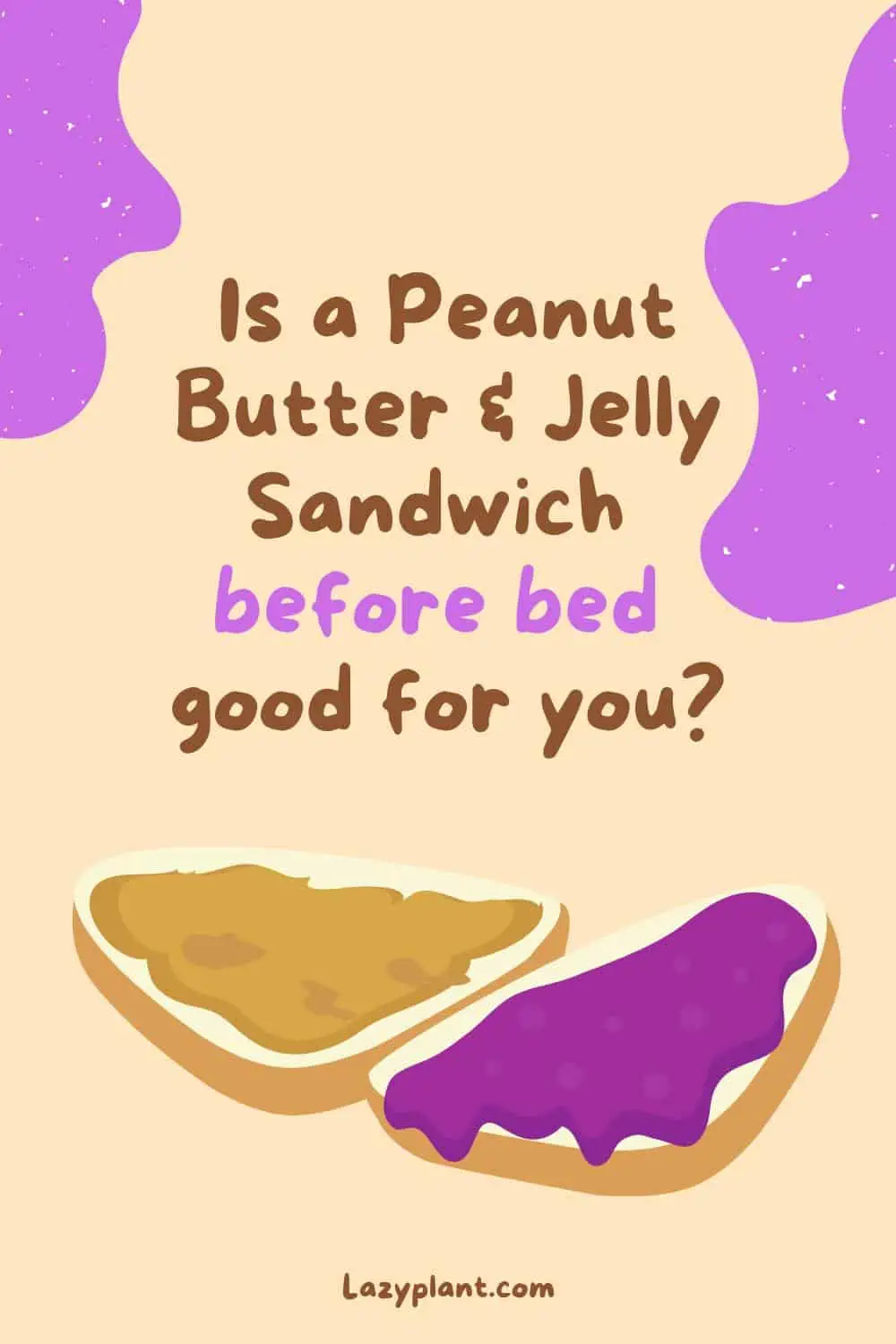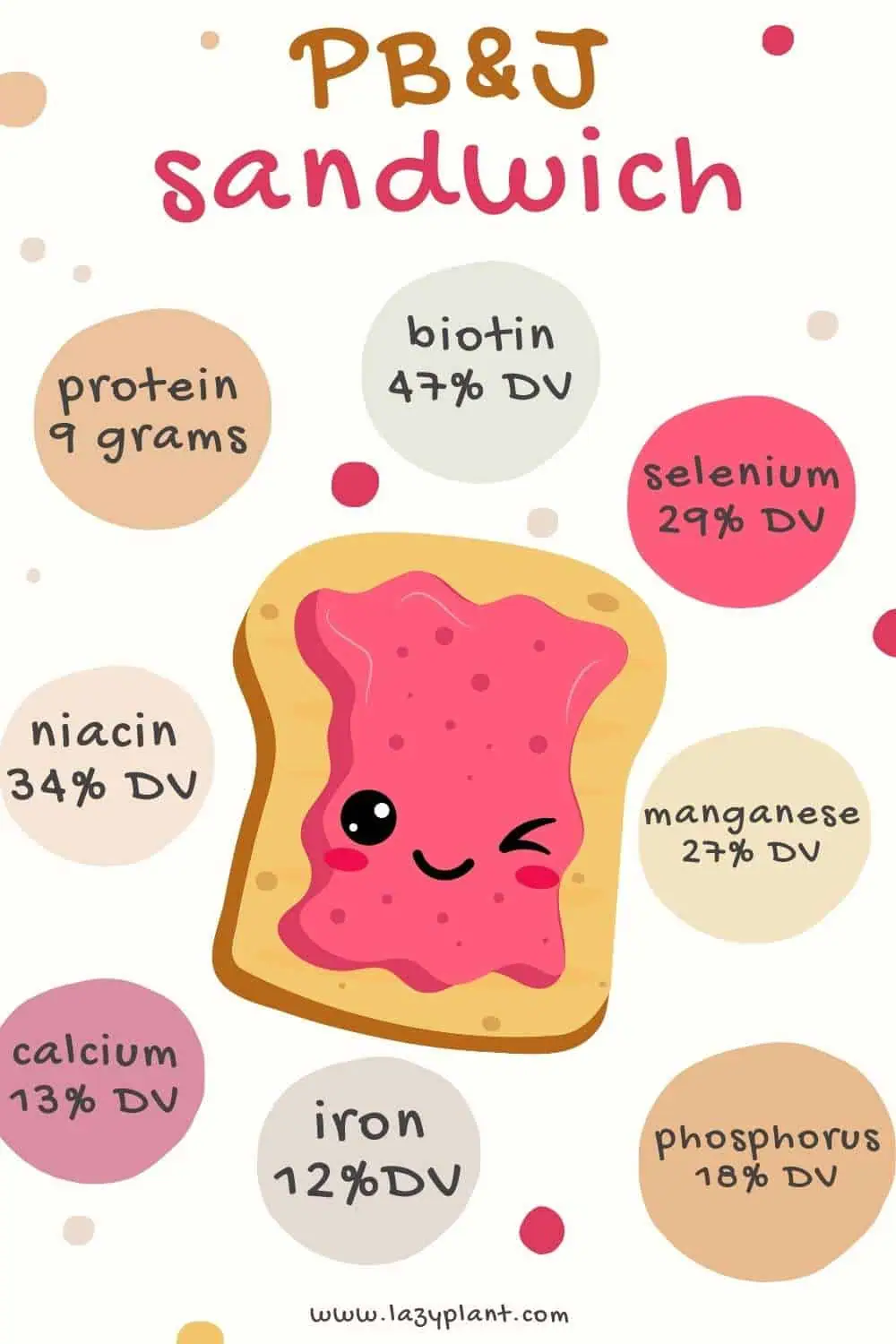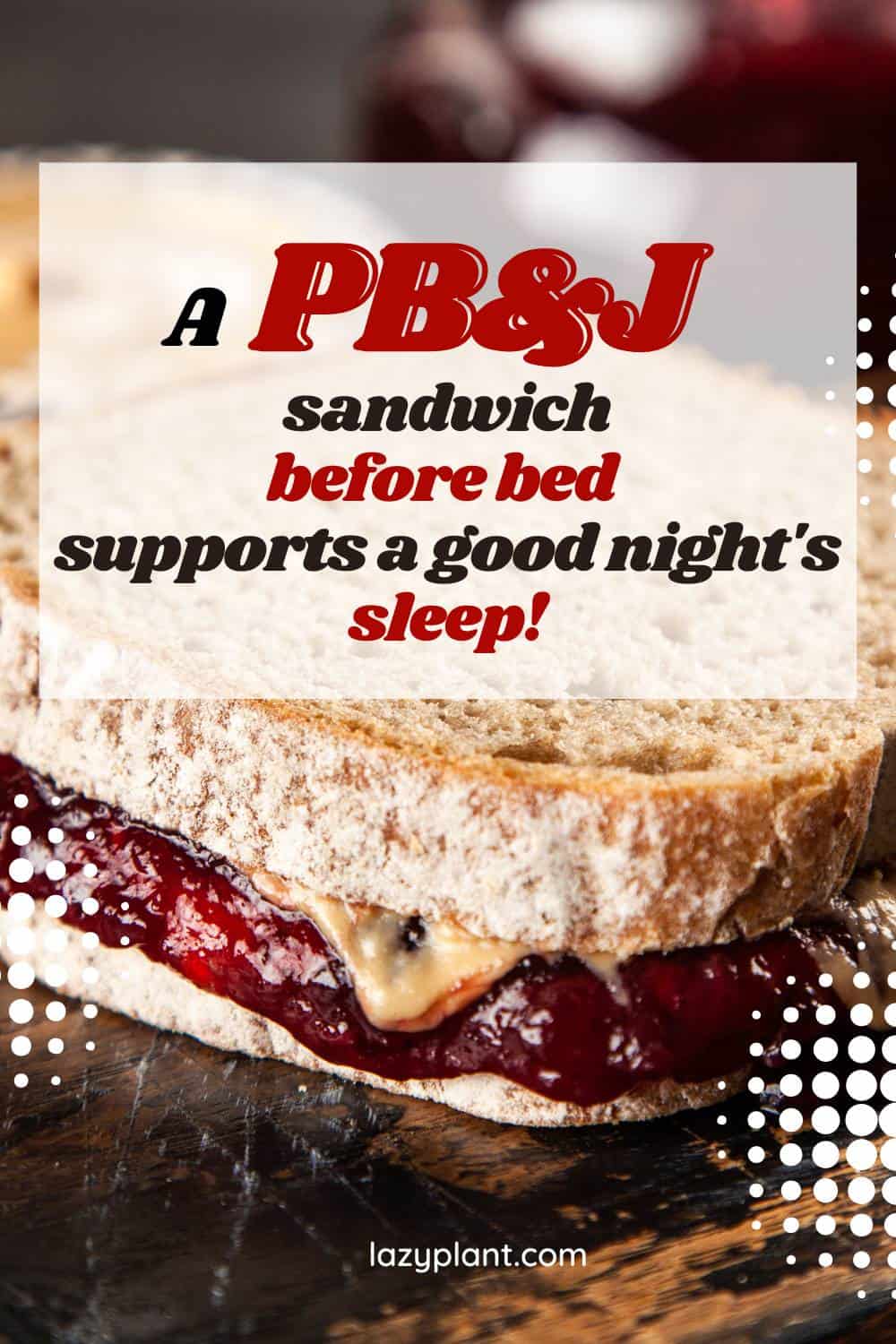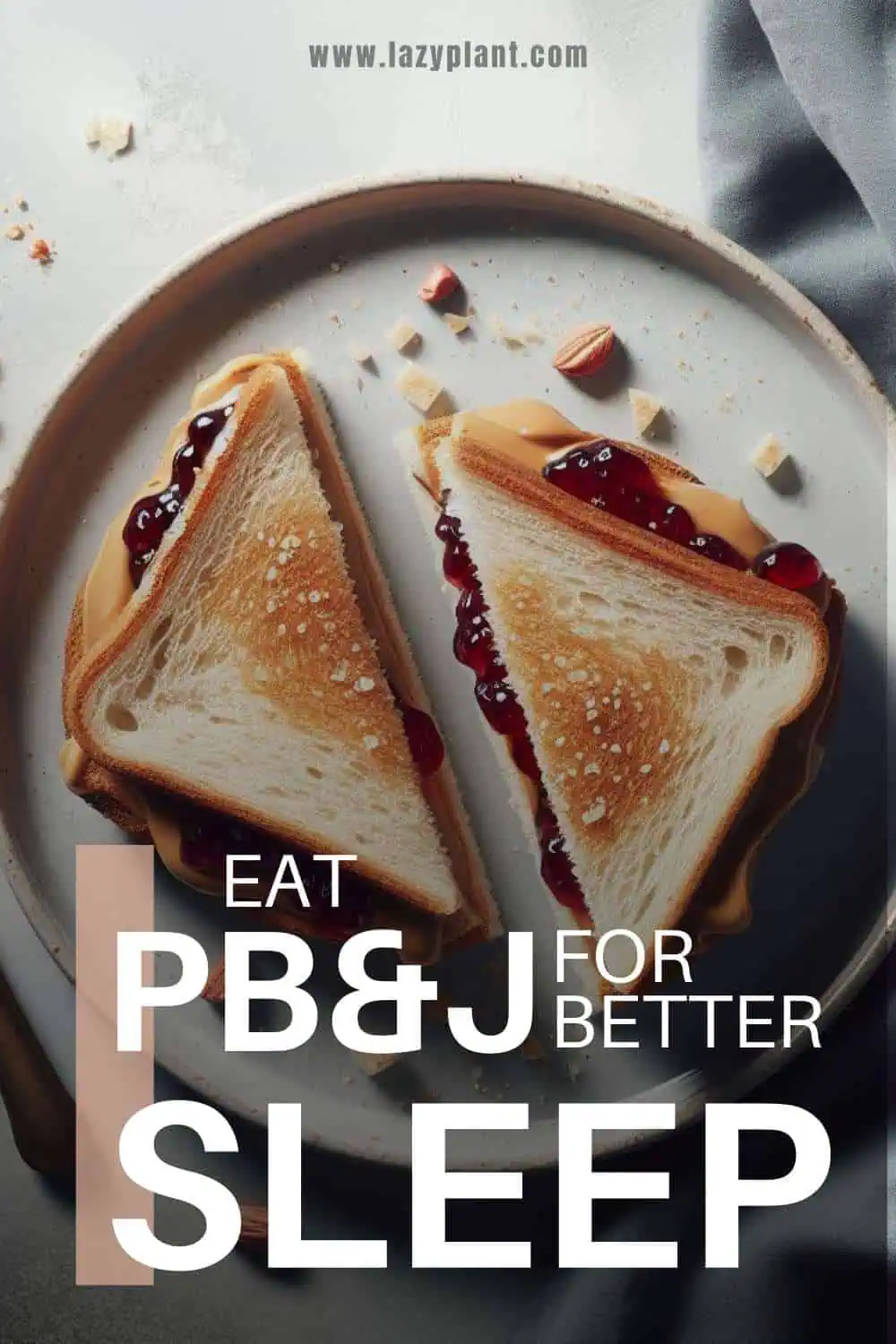A PB&J sandwich with sugar-free jelly and whole-wheat bread, a couple of hours before bed, supports a good night’s sleep . It’s packed with compounds that improve sleep quality, duration and onset latency, such as:
- tryptophan
- niacin
- magnesium
- resveratrol
- vitamin E
- protein
- fiber
- healthy fats
A PB&J sandwich for Dinner may help you Sleep better at Night
Eating a peanut butter and jelly sandwich with whole-wheat bread and high-quality, sugar-free jelly at dinner may have beneficial effects on sleep onset, quality, and duration! It’s one of the most nutrient-dense foods you can eat daily on a budget.
| Nutrient | per serving | % DV |
|---|---|---|
| calories | 302 | 15% |
| protein (g) | 9,1 | |
| carbs (g) | 44,6 | |
| fat (g) | 9,9 | 13% |
| sugar (g) | 12,8 | 51% |
| biotin (mg) | 14 | 47% |
| niacin (mg) | 5,4 | 34% |
| selenium (mcg) | 16,2 | 29% |
| manganese (mg) | 0,6 | 27% |
| thiamine (mg) | 0,3 | 25% |
| phosphorus (mg) | 128 | 18% |
| copper (mg) | 0,2 | 18% |
| tryptophan (g) | 0,04 | 9% |
| calcium (mg) | 128,4 | 13% |
| iron (mg) | 2,2 | 12% |
| magnesium (mg) | 46,9 | 11% |
| riboflavin (mg) | 0,1 | 11% |
| zinc (mg) | 1 | 9% |
| fiber (g) | 2,5 | 7% |
| vitamin B6 (mg) | 0,1 | 7% |
| pantothenic acid (mg) | 0,3 | 6% |
| vitamin E (mg) | 0,9 | 6% |
| potassium (mg) | 182,4 | 4% |
| folate (mcg) | 15,5 | 4% |
Tryptophan
Above all, a peanut butter and jelly sandwich before bed may support a good night’s sleep because it’s an excellent dietary source of tryptophan.
This amino acid plays a key role in the production of the neurotransmitter serotonin. Serotonin is involved in regulating mood, and sleep. High tryptophan intake may be beneficial for improving sleep latency and obstructive sleep apnea![1]

Furthermore, tryptophan is involved in the synthesis of melatonin. This hormone is the internal clock of the body. It regulates sleep! We can skyrocket melatonin levels in the body by consuming foods naturally high in melatonin.[2]
A PB&J sandwich has about 37 mg of tryptophan, which is almost 9% of the Daily Value. Almost all tryptophan comes from peanut butter with bread containing small amounts.
Another great snack that supports a good night’s sleep, as it’s particularly high in tryptophan, is a turkey sandwich.
Moreover, tryptophan is necessary for the synthesis of niacin.
B Vitamins
A PB&J sandwich is particularly rich in most B vitamins. These vitamins play a crucial role in many bodily functions, and some have been linked to improved sleep quality.
- Vitamin B6: This vitamin helps produce neurotransmitters like serotonin and melatonin, which regulate mood and sleep-wake cycles. Deficiencies in B6 have been associated with insomnia and sleep disturbances.
- Folate (Vitamin B9): Folate, along with B12, is necessary for melatonin production. Studies suggest that low folate levels might be linked to sleep problems.
- Niacin (Vitamin B3) plays a role in energy production and nervous system function, which can indirectly impact sleep quality. Niacin and magnesium relax the muscles.[3]
- Other B vitamins: Research on the connection between thiamine (B1), riboflavin (B2), pantothenic acid (B5), and biotin (B7) for sleep is limited. However, deficiencies in these vitamins can cause fatigue and other health issues that might disrupt sleep.
A PB&J sandwich has no vitamin B12, which among others, is involved in melatonin production. Deficiency in B12 can lead to sleep issues and daytime fatigue.
As only a few plant-based foods are naturally rich in vitamin B12, you should be very cautious about getting adequate amounts. Vitamin B12 deficiency is among the most common nutrient deficiencies worldwide. Milk and eggs are among the best dietary sources!
Selenium
A PB&J sandwich provides 29% DV of selenium. Some studies have observed a correlation between low selenium levels and sleep problems like difficulty falling asleep or staying asleep.[4]
Selenium might play a role in regulating thyroid function, which can indirectly impact sleep quality. It might also contribute to antioxidant processes that help reduce oxidative stress, which can disrupt sleep.
There is no need to take selenium supplements. The richest food in selenium is Brazil nuts with 2 nuts providing more than 100% DV!
Manganese
Manganese in a PB&J sandwich (27% DV per serving) might be involved in the production of GABA, a neurotransmitter that promotes calmness and relaxation. In theory, sufficient manganese could contribute to better sleep by supporting GABA production.[5]
Manganese is an essential mineral with antioxidant properties. Antioxidant compounds can help fight free radical damage in the body, which can disrupt sleep patterns. Furthermore, manganese plays a role in activating enzymes necessary for various bodily functions, potentially including some related to sleep regulation.
Phosphorus
Phosphorus (18% DV) is essential for various cellular functions, some of which might indirectly contribute to sleep regulation. Getting adequate amounts of phosphorus seems to reduce the risk of poor sleep qualityy and sleep latency! People with low levels are more likely to use sleep pills.[6]
Copper
Copper might be a secret weapon for better sleep. Above all, it helps your body produce melatonin and plays a role in how the brain regulates sleep.[7]
Low copper levels might be linked to sleep disturbances. Some studies suggest copper can improve sleep quality and reduce sleep apnea episodes.
A PB&J sandwich provides 18% DV.

Calcium
Calcium isn’t just for strong bones! It plays a crucial role in promoting restful sleep. Studies suggest a link between low calcium intake and insomnia. Ensuring adequate calcium intake might contribute to a smoother transition into deeper sleep stages and a more restful night overall.[8]
It helps your body produce melatonin. With sufficient calcium, your body can naturally switch to sleep mode when darkness falls.
Additionally, calcium helps keep your muscles relaxed throughout the night. When calcium levels are low, muscle cramps can disrupt your sleep and leave you feeling exhausted in the morning.
A PB&J sandwich provides about 13% DV of calcium. You could combine it with a glass of milk or kefir at dinner to skyrocket your calcium and tryptophan intake!
I try to consume foods rich in calcium with eggs which among others, they’re naturally rich in vitamin D that helps absorb calcium. Vitamin D is not naturally present in milk or yogurt, but dairy foods are usually fortified with vitamin D.
Iron
Iron is an important mineral for sleep because it helps your body produce red blood cells, which carry oxygen throughout your body. Oxygen is essential for all bodily functions, including sleep. Without enough iron, you might feel tired and struggle to fall asleep or stay asleep.
Iron plays a role in the production of neurotransmitters that regulate mood and sleep-wake cycles. Low iron levels might be linked to difficulty sleeping. Iron deficiency can contribute to restless legs syndrome, causing uncomfortable sensations that disrupt sleep.[9]
A PB&J sandwich provides 12% DV!
You could replace peanut butter with tahini to boost your iron intake. Tahini is one of the richest vegan sources of iron. As it’s one of the most nutrient-dense foods you can eat every day, I regularly use it instead of peanut or almond butter in recipes.
Zinc
Zinc plays a vital role in regulating sleep patterns. Having sufficient zinc can help your body naturally regulate sleepiness. Studies suggest people with adequate zinc levels tend to experience deeper, more restorative sleep.
On the contrary, zinc deficiency has been linked to restless sleep and waking up frequently during the night.
A PB&J sandwich providing 9% DV per serving is a great dietary source. Nuts, seeds, yogurt, cheese, eggs, and turkey are other common good sources that you could include in your dinner.
Magnesium
A PB&J sandwich before bed may have beneficial effects on sleep because it’s a great dietary source of magnesium with 11% DV per serving. Both peanut butter and bread contain decent amounts. Magnesium may improve sleep onset latency, early morning awakening, snoring, sleep duration, and daytime falling asleep. Especially in elderly people.[10,11]
Vitamin E
Vitamin E may play a role in sleep disorders because it has a potent antioxidant activity. Vitamin E has a protective effect on sleep quality. A serving provides 6% DV.[12]
Resveratrol
A PB&J sandwich is an excellent source of resveratrol which is a polyphenol with potent antioxidant actions.
The combination of resveratrol, tryptophan, and vitamin E seems beneficial for treating sleep disturbances. Resveratrol ameliorates anxiety and has potent antioxidant, anti-inflammatory and neuroprotective properties. It may have beneficial effects on obstructive sleep apnea.[13]
Peanuts, berries, grapes, and red wine are the main dietary sources. That’s one key reason why I prepare PB&J sandwiches with high-quality peanut butter and berry jam.

Fiber
Even a typical PB&J sandwich made with white bread provides 7% DV of fiber.
Diets higher in fiber and healthy fats are associated with better sleep quality.[14]
Peanut butter is one of the richest foods in monounsaturated fats. When consumed in moderation and when they are consumed instead of saturated fats, monounsaturated fats have a beneficial effect on the heart.[15]
I always use whole-grain bread to prepare my favorite snack. If you prepare a PB&J sandwich with high-quality, fiber-rich ingredients, you can get more than 40% DV of fiber!
Protein
Moreover, a PB&J sandwich provides approximately 9 grams of protein. Diets high in protein are associated with better sleep quality.[16]
Protein provides the building blocks for neurotransmitters like serotonin, which your body converts into melatonin. Enough protein helps your body produce the chemicals it needs for sleep regulation.
Moreover, protein keeps you feeling fuller for longer compared to carbs. This can prevent those midnight hunger pangs that disrupt sleep.
Additionally, protein is essential for rebuilding tissues, a process that takes place at night while we sleep.
Common PB&J sandwiches before bedtime are bad for Sleep
However, a typical peanut butter and jelly sandwich may not be the best late-night snack because it’s particularly high in sugar.
High amounts of sugar at night may lead to poor sleep quality and frequent arousals. It’s beneficial to avoid foods with added sugar 4 hours before bedtime.[17]
Added sugar causes a rapid rise in blood sugar levels. This is followed by a sharp drop, which can lead to feelings of hunger and wakefulness later at night.
Don’t consume any added sugar 4 hours before going to bed for better sleep.
The fluctuations in blood sugar due to added sugar can disrupt your sleep cycle, making it harder to fall asleep and stay asleep throughout the night. The body releases insulin to manage the blood sugar surge caused by added sugar. This insulin response can interfere with the production of melatonin, making it harder to fall asleep.
Additionally, high sugar intake can contribute to increased levels of stress hormones like cortisol, which counteract the sleep-promoting effects of melatonin.
Keep in mind that cheap jellies and jams, white bread, and even certain peanut butters can be packed with added sugar. There are jams, jellies, or marmalades with no added sugar. Natural, low-glycemic sugar substitutes, such as monk fruit or stevia are used, instead.
The top 4 bestseller jams on Amazon have no added sugar.
How to prepare the healthiest PB&J sandwich for a good night’s Sleep?
Choose whole-wheat bread. Fiber digests slower, providing sustained energy and preventing blood sugar spikes that can disrupt sleep. It promotes satiety, keeping you feeling fuller for longer and preventing hunger pangs that might wake you up.
While sugar cravings are common at night, avoid sugary jams. Opt for sugar-free or low-sugar varieties made with natural sweeteners like stevia or monk fruit.
Even with healthy ingredients, moderation matters. Use a moderate amount of peanut butter and jam to avoid feeling overly full before bed. A tablespoon of each is sufficient.
If you find sugar-free options unappealing, explore alternatives like mashed banana or a thin layer of nut butter mixed with cinnamon. I always sprinkle some cinnamon on carbohydrate-rich snacks. Not only does it enhance flavors but also it regulates insulin response and boosts the antioxidant capacity of the meal.
How to eat a PB&J sandwich at night for better Sleep?
With Water
Waking up thirsty in the middle of the night can disrupt sleep. Drinking water with your PB&J helps prevent this.
Dehydration could also contribute to heartburn, a common sleep disruptor and lead to night sweats, which can interrupt sleep and leave you feeling restless.
Furthermore, proper hydration helps your body regulate its temperature. This can be especially helpful at night when your core temperature naturally dips.
While water is essential, avoid overdoing it right before bed. A small glass or two with your PB&J should suffice. If you find drinking water before bed makes you need to use the restroom frequently, adjust the timing accordingly.

With Chamomile Tea
Chamomile tea is a popular herbal remedy known for its calming and relaxing effects. It might help reduce anxiety and ease you into sleep mode. It contains apigenin, a flavonoid that may bind to certain brain receptors and promote sleepiness. If you have a hard time drinking tap water, chamomile tea might be a great alternative.
Milk
Milk is a natural source of tryptophan, an amino acid that the body converts into melatonin, and also contains calcium, which might play a role in regulating sleep patterns and promoting relaxation.
I drink kefir at dinner instead. Kefir is a fermented milk beverage. It’s the richest common food in probiotics, which are beneficial gut bacteria. It plays a key role in gut health, which has been linked to better sleep quality.
Red Wine
You could also drink at dinner small amounts of certain red wine cultivars or cranberry juice, as they’re by far the richest common beverages in melatonin! Be mindful of portion sizes though. High amounts of alcohol (wine) or sugar (cranberry juice) can have the opposite effects.
How long before bed should I eat a PB&J sandwich?
Ideally, have your PB&J sandwich at least two hours before bedtime to allow for proper digestion and prevent sleep disruptions. The timing of dinner plays a key role in weight loss as well as a good night’s sleep. Eating right before going to bed has detrimental effects on body weight and sleep onset, quality, and duration.
Should I eat it in the Evening for improved Sleep Quality?
No, there is no need to eat PB&J for dinner. You can eat your favorite snack whenever fits into your diet plan. The best times to eat a PB&J sandwich are at breakfast, between meals as a healthy, super-filling snack, or after exercise.
A healthy PB&J Sandwich for Dinner supports Weight Loss
Incorporating a PB&J sandwich into your diet plan could help you lose weight.
Maintaining a lean body composition can contribute to better sleep in several ways. For instance, excess weight, particularly around the neck, can obstruct airways during sleep, leading to sleep apnea. This condition disrupts sleep quality and can cause frequent awakenings, leaving you feeling tired and groggy during the day.
Lean individuals tend to experience deeper, more restorative sleep compared to those with higher body fat percentages. This means they spend less time in lighter sleep stages and wake up feeling more refreshed.
Moreover, excess body fat is linked to chronic low-grade inflammation, which can disrupt sleep patterns and contribute to sleep disturbances. Also, fat cells can interfere with the production and regulation of hormones like leptin and adiponectin, which play a role in sleep-wake cycles.
Which are the healthiest late-snack snacks for better Sleep?
Opting for lighter dinner ideas can contribute to a better night’s rest.
Whole-Wheat Toast with Nut Butter: Whole-wheat bread provides complex carbohydrates for sustained energy, while nut butter (almond, peanut, tahini) offers protein and healthy fats for satiety.
Greek Yogurt with Berries: My other favorite late-night snack. Greek yogurt is a protein powerhouse that promotes sleep hormone production. Pair it with berries for antioxidants and a touch of sweetness. I sprinkle some cinnamon and add 3-4 walnuts for omega-3s. Walnuts also support a good night’s sleep.
Cottage Cheese with Sliced Vegetables: Cottage cheese is another good source of protein and calcium, which can aid sleep regulation. Vegetables add essential vitamins and fiber.
Warm Banana with Cinnamon: Bananas are a natural source of melatonin and potassium, both beneficial for sleep. A sprinkle of cinnamon adds warmth and may regulate blood sugar.
Tart Cherry Juice: Some studies suggest tart cherry juice may improve sleep quality, particularly for those with insomnia.
Chamomile Tea: Chamomile is a well-known herbal remedy known for its calming and relaxing properties, potentially promoting better sleep. It also helps burn fat.
Warm Milk: Milk is a natural source of tryptophan, an amino acid converted into melatonin. Warm milk can also be a soothing bedtime beverage. Kefir is a healthier alternative though.
Hard-Boiled Eggs: Eggs are a protein source that can keep you feeling full and satisfied throughout the night.
Edamame: Edamame (soybeans) are a good source of plant-based protein and fiber, promoting satiety and potentially aiding sleep.
Popcorn (Plain): Air-popped popcorn is a whole-grain snack low in calories and high in fiber. No wonder why it’s your ally on your weight-loss journey! Skip the butter and unhealthy toppings for a sleep-friendly option.
Turkey Slices with Whole-Wheat Crackers: Turkey is a lean protein source that promotes satiety. Pair it with whole-wheat crackers for a balanced and filling snack.